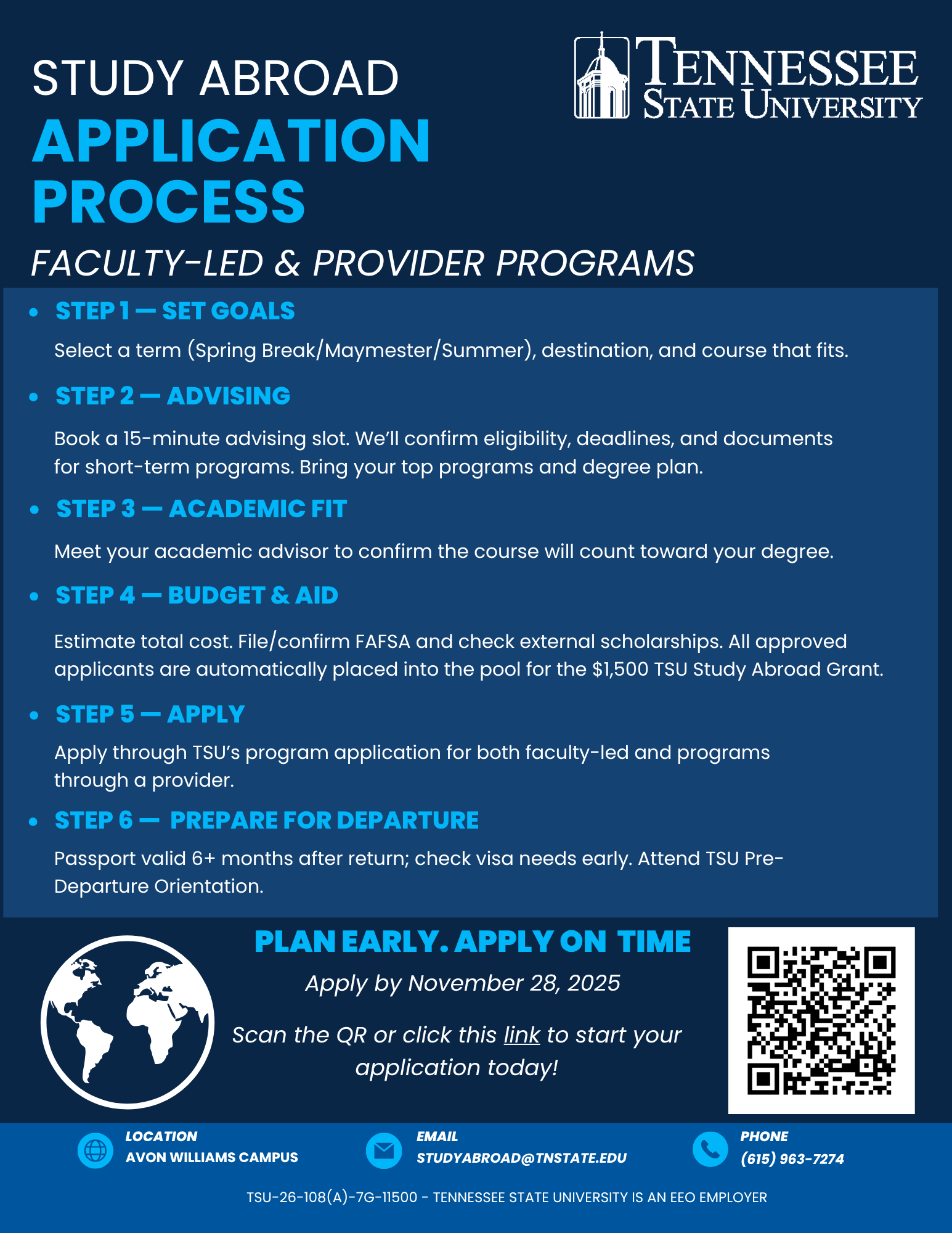- Home >
- International Affairs
- > Getting Started
Getting Started
Your Path to Going Global
Navigating your study abroad journey is an exciting process, and the TSU Office of International Programs and Academic Global Engagement is here to guide you every step of the way. We offer various advising options tailored to your program interest and timeline.
We highly recommend connecting with our team early in your planning to ensure a smooth and successful experience.
- TSU Faculty-led Programs
- Consortium (TBR Global Studies)
-
Third-Party Vendors
- Please note: If you enroll in a third-party provider program, you must complete both the provider’s application and TSU’s required IEGL registration steps. If you are not pre-approved by TSU, you may be ineligible for academic credit and/or financial aid.
Attend TSU’s Study Abroad Fair and our Education Abroad 101 sessions each fall and spring to get the big picture and compare options. You’ll learn how TSU programs work, what funding exists, and how to stay on track for graduation. You can also explore opportunities at any time by reviewing TSU’s faculty-led, consortium, and vendor-partner programs on our site and booking an advising appointment with International Education & Global Learning (IEGL).
Apply early. Passport and visa timelines can slip. Build in a buffer so your travel isn’t at risk. You’ll need a valid passport in hand before you can apply for any visa.
Who needs a passport?
-
U.S. citizens: A valid U.S. passport is required for all international travel, including Canada and Mexico.
-
Non-U.S. citizens (F-1/J-1, permanent residents, etc.): You must travel with a valid passport from your home country and all required U.S. immigration documents (e.g., I-20/DS-2019, I-94, visa, green card, EAD). Your process differs from U.S. passport applicants—contact IEGL/your DSO for guidance specific to your status.
When should I apply?
Apply as soon as you decide to pursue a program—ideally 3–6 months before travel (earlier if a visa is required). Visa processing varies by country; you cannot start most visa applications until your passport is issued.
First-time U.S. passport (DS-11)
You must apply in person at a Passport Acceptance Facility (e.g., many post offices, county clerk offices) or a Passport Agency (for urgent travel). However, TSU has its own passport acceptance facility.
Bring:
-
Proof of U.S. citizenship (one): certified birth certificate, Consular Report of Birth Abroad, Certificate of Naturalization, or Certificate of Citizenship.
-
Valid government photo ID (one): driver’s license, military ID, government ID, or Naturalization Certificate.
-
Two identical passport photos that meet U.S. State Department requirements.
-
Payment for all fees (application + execution; expedited shipping if needed).
Important: If you fill out the online application (DS-11), do not sign until instructed by the acceptance agent.
Renewing a U.S. passport (DS-82)
If you’re eligible, you can usually renew by mail using Form DS-82. If you’re not eligible (e.g., your passport was issued when you were under 16, it’s too damaged, or too long expired), you’ll renew in person using DS-11. Check requirements before you assume mail-in eligibility.
U.S. Permanent Residents
Carry your home-country passport and your green card when you travel. Verify whether your destination requires a visa for your nationality and start that application as soon as your travel dates are set.
Your next steps (TSU)
-
Contact the Office of International Programs and Academic Global Engagement to book your passport appointment.
-
Check current processing times, fees, and forms at the U.S. Department of State: travel.state.gov (look for “Processing Times,” “Fees,” “Photo Requirements,” and “Acceptance Facility Search”).
-
Set deadlines: target a passport submission date that’s no later than 3 months before departure (earlier if a visa is needed).
-
Consider expedited service if you’re inside a tight window.
Have questions about which documents you need for your status or destination? Contact International Education & Global Learning (IEGL)—we’ll give you the exact sequence and paperwork so you don’t miss a step.

webpage contact:
ODIA


